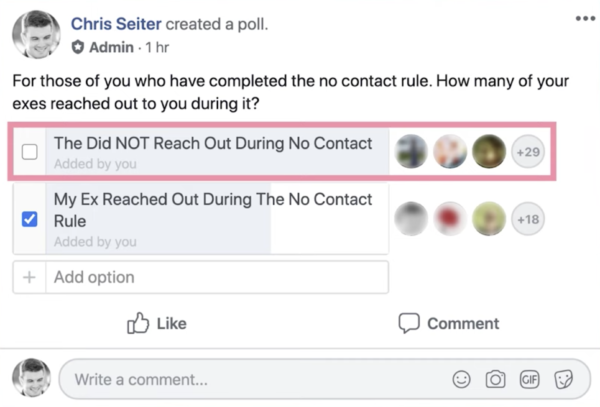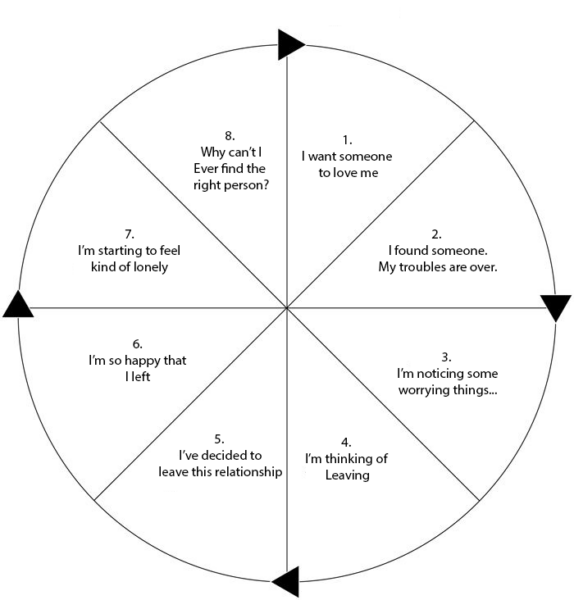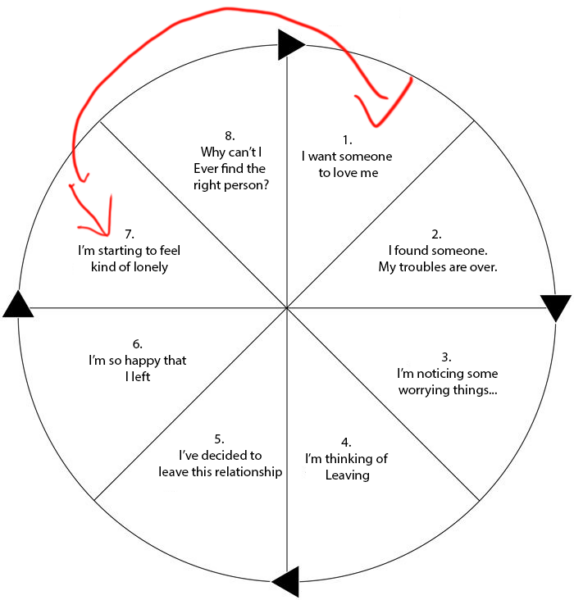Today we’re going to answer the question if men get over breakups faster than women.
On the surface level it may appear that men get over breakups quicker than women but that’s not necessarily true. Research has shown us that they have a different way of processing grief than women.
Today we’re going to figure out why.
And really we have these reasons to blame,
- Evolution makes breakups harder for women than men
- How men express their feelings different in the post breakup period than women
- Most of the exes we’ve studied are avoidant and there’s a tendency to move on quickly
Let’s dive in and talk about them a little bit more in-depth.

What Are Your Chances of Getting Your Ex Boyfriend Back?
Take the quizEvolution Makes Breakups Harder For Women Than Men
In 2015 Binghamton University conducted a study looking at the pain that breakups cause.
Their findings are obviously relevant to the discussion we’re about to have,
They found that women tend to be more negatively affected by breakups, reporting higher levels of both physical and emotional pain. Women averaged 6.84 in terms of emotional anguish versus 6.58 in men. In terms of physical pain, women averaged 4.21 versus men’s 3.75. While breakups hit women the hardest emotionally and physically, women tend to recover more fully and come out emotionally stronger. Men, on the other hand, never fully recover — they simply move on.
So, the research shows that men, on average, do feel less pain after a breakup but that doesn’t mean they have completely gotten over the breakup. Rather, it seems like they’ve found an unhealthy coping mechanism which backs what we are seeing in our internal studies (more on that in a second.)
So, why is it that women tend to take breakups harder than men initially?
Evolution.
According to the lead author of the study, Craig Morris,
“Put simply, women are evolved to invest far more in a relationship than men,” Morris said. “A brief romantic encounter could lead to nine months of pregnancy followed by many years of lactation for an ancestral woman, while the man may have ‘left the scene’ literally minutes after the encounter, with no further biological investment. It is this ‘risk’ of higher biological investment that, over evolutionary time, has made women choosier about selecting a high-quality mate. Hence, the loss of a relationship with a high-quality mate ‘hurts’ more for a woman.”
So, because women bear the greater responsibility of gestation they take greater care of who they choose to mate with. Therefore, they tend to invest a lot more into relationships than men.
I’ve often said that from an evolutionary standpoint human beings have two core functions.
- Survive
- Replicate
It’s a little like yin/yang if you think about it.
Scientists will argue that women are there to help babies survive. Men are there to spread their seed to propagate the race.
It’s crude but primally there is some merit to the argument.
Not to say all men are dogs and will “spread their seed” to everyone imaginable. Humans have actually evolved past the initial survive and replicate stage. We now look for more in our relationships. We expect more, demand more.
- Commitment
- Love
- Security
But if you strip everything away that primal need still remains and it might indeed help explain why we have such wildly different reactions to breakups across genders.
Speaking of wildly different reactions. Let’s look at that now.
Looking At How Men Express Their Feelings After A Breakup Vs. How Women Do
So, what are the major differences in how men and women process their grief during the breakup period?
According to Craig Morris,
“Men report more feelings of anger and engage in more self-destructive behaviors than women. Women, in comparison, frequently feel more depressed and participate in more social, affiliative behaviors than men. Women’s behaviors could be argued to be more constructive strategies as a result of their tendency to preserve the relationship, whereas men choose destructive strategies for maintaining their own self-esteem.”
So, men grow angry and engage in self destructive behaviors while women feel more depressed.

What Are Your Chances of Getting Your Ex Boyfriend Back?
Take the quizYet what I’ve personally found is that most of the men we study here on Ex Boyfriend Recovery don’t say anything at all. In fact, a study of the no contact rule showed that on average most men don’t even reach out to their exes with an angry text during it,
So, what gives?
Well, turns out Morris has an answer for that question as well,
“The man will likely feel the loss deeply and for a very long period of time as it ‘sinks in’ that he must ‘start competing’ all over again to replace what he has lost — or worse still, come to the realization that the loss is irreplaceable,” he said.
Initially it was put forth that men, rather than wallowing in grief will distract themselves by moving on to someone new. So, the breakup hasn’t really “sunk in” or hit them but it will. Oh, the toll will be paid but I’ll get to that in a moment.
What I think is incredibly undervalued with most of our clients is the realization that most “male exes” are stewing quietly.
There is anger.
There is resentment.
But it’s the quiet kind. Constantly simmering. Sometimes even pushed to the side and forgotten when they find a distraction but it’s always there and eventually it will come to head and that’s where our recent research with avoidants come into play.
Most Exes We’ve Studied Are Avoidant And That’s Relevant For A Lot Of Reasons
So, here’s what we know about how men handle breakups so far.
- They move on quickly
- They are angry
- Eventually it hits them but later than women
This all sounds very avoidant by nature.
If you aren’t familiar an avoidant person here’s their M.O.
Avoidant Attachment Style: Someone with an avoidant attachment style deeply value independence so when they feel like their independence is going to be taken away they’ll often rebel by either breaking up with you, starting a fight or simply disappearing
According to Free To Attach,
This comes from a deep subconscious assumption of abandonment – often some of their earliest developmental learning – that their attachment figure will hurt them in some way and will eventually reject them, particularly if emotions come to the fore. If someone tried to get close it is risking their non-negotiable self-reliance.
So, this certainly explains men’s ability to move on quickly but what about how the breakup hits them later than women?
Well, for that I’d like to turn your attention to my relationship death wheel,
There are eight main stages to it.
- They start out wanting someone to love them
- Then they find you, and at first, things are great
- But something about your behavior sets them off (we will talk about what that is in a minute)
- They use that as an excuse to think about leaving you
- Then they actually decide to leave the relationship
- Then of course they party and are happy they left the relationship
- But there is a loneliness in the silence and they start to grow depressed
- They ultimately sit and wonder why this always happens to them. Why can’t I ever find the one?
But the stages of particular interest to our discussion occur during stage 7, 8 and then the re-revolution around to stage 1.
It’s here that the breakup fully hits for the avoidant.
And this backs up my findings that I talked about in this video,

What Are Your Chances of Getting Your Ex Boyfriend Back?
Take the quizEssentially the argument is simple.
The avoidant won’t truly begin to miss you or process the breakup until they feel safe doing so and they only feel safe doing so if they feel like you have moved on from them which might actually explain why, for most of the men we’ve studied breakups tend to him them later in the process.
But our clients can actually have an impact on that.
What do I mean?
Well, while most of our clients exes are avoidant most of our clients are anxious,
What does that mean?
Well, it means that they get overly anxious during a breakup and try to fix things by any means necessary but this often just pushes the avoidant further away.
Here’s my point,
Men process breakups later so if you give them time to process the breakups you’ll start to see that typical grief filled behavior in time.
Here’s the great irony though. Many of my clients who have figured this out actually end up moving on by the time their ex “feels” the breakup. This is why we see so many stories of exes, sometimes years later, coming back into the picture.



